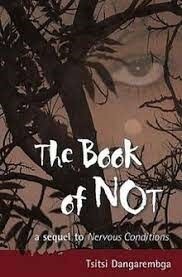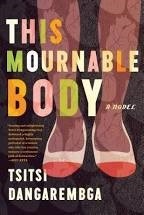A trilogy by Tsitsi Dangarembga
 In her latest book This Mournable Body (shortlisted for the 2020 Booker Prize), Tsitsi Dangarembga returns to the protagonist of her first novel Nervous Conditions (1988) and its sequel The Book of Not (2006). Her debut novel was the first to be written in English by a black woman from Zimbabwe. Her debut novel dealt with the girl called Tambu who grew up in a Shona family in Rhodesia, now Zimbabwe, in the 1960s. In the third part of the trilogy, Tambu is middle-aged.
In her latest book This Mournable Body (shortlisted for the 2020 Booker Prize), Tsitsi Dangarembga returns to the protagonist of her first novel Nervous Conditions (1988) and its sequel The Book of Not (2006). Her debut novel was the first to be written in English by a black woman from Zimbabwe. Her debut novel dealt with the girl called Tambu who grew up in a Shona family in Rhodesia, now Zimbabwe, in the 1960s. In the third part of the trilogy, Tambu is middle-aged.
Background
Tsitsi Dangarembga was born on 4 February 1959 in the small town of Mutoko, Southern Rhodesia (now Zimbabwe), where her parents taught at the nearby mission school. Her mother was the first black woman in Southern Rhodesia to obtain a university degree and her father was a school headmaster. Tsitsi herself read Medicine at the University of Cambridge in the United Kingdom, but after becoming a victim of racism and feeling alienated, she left again after three years to return to her homeland and took up psychology at the University of Zimbabwe. She joined the university drama club and it is in this period of her life that she wrote three plays. She also read works by African American women writers and contemporary African literature.
In 1989, Tsitsi went to Germany to study film direction at the German Film and Television Academy Berlin, producing a number of films and founding Nyerai Films, a production company based in Harare. Her 2006 film “Peretera Maneta” received the UNESCO Children's and Human Rights Award and won the Zanzibar International Film Festival. She is the executive director of the organisation Women Filmmakers of Zimbabwe and the founding director of the Women's Film Festival of Harare. The author currently resides in Harare.
Filmmakers of Zimbabwe and the founding director of the Women's Film Festival of Harare. The author currently resides in Harare.
The Trilogy
Nervous Conditions received domestic and international acclaim, and was awarded the Commonwealth Writers' Prize (Africa region) in 1989. The book was included on the BBC's 2018 list of top 100 books that have shaped the world. However, it was rejected at least four times: it was considered too radically feminist for conservative Zimbabwe. It was eventually published by the Women’s Press in London. Since then it has become a contemporarily relevant novel about what it means to be a young woman in a patriarchal culture. The novel, semi-autobiographical, deals with a girl called Tambu who grows up in a Shona family in Rhodesia, now Zimbabwe, in the 1960s.
 The Book of Not continues the story of Tambu; spanning the period from white-minority rule in Rhodesia to the emergence of an independent Zimbabwe in the 1980s. Tambu’s story is parallel to the nation’s transition to new nationhood, as she continues to search for self-knowledge and confronts issues such as women’s rights, class differences and prejudice. The novel brings insights to the dilemmas and contradictions that are the legacy of colonialism and globalization.
The Book of Not continues the story of Tambu; spanning the period from white-minority rule in Rhodesia to the emergence of an independent Zimbabwe in the 1980s. Tambu’s story is parallel to the nation’s transition to new nationhood, as she continues to search for self-knowledge and confronts issues such as women’s rights, class differences and prejudice. The novel brings insights to the dilemmas and contradictions that are the legacy of colonialism and globalization.
In This Mournable Body, the final instalment of the trilogy, Tambu is middle-aged and the novelist writes in a more distanced manner, in the second person instead of the first person as in her previous two novels: as if Tambu just cannot believe what has become of her life and wishes to distance herself from it. Tambu’s sense of alienation and disconnectedness is shown in the new Zimbabwe, where post-colonial politics are built on corruption and however hard you try, every effort seems to be no longer followed by reward. Tambu’s journey takes place in the city of Harare, in the late 1990s, when the young country is beginning to flounder, and Tambu becomes increasingly impoverished, living off her savings. The structure of the novel becomes more episodic, as Tambu seizes opportunities to find a job only to fail yet again. However, she remains the optimistic character she was in the previous two novels as she struggles against the restrictions and contradictions of her new life in the capital.
beginning to flounder, and Tambu becomes increasingly impoverished, living off her savings. The structure of the novel becomes more episodic, as Tambu seizes opportunities to find a job only to fail yet again. However, she remains the optimistic character she was in the previous two novels as she struggles against the restrictions and contradictions of her new life in the capital.
Ecotourism
The combined effect of colonialism and capitalism is shown when Tambu is offered a job by Tracey, a white Zimbabwean, in the ecotourism business. However, there is a price to be paid as Tambu turns her village into an ecotourist site and the women of the village are forced to stage an “authentic African experience” for European tourists by dancing with their torsos bare. This is reminiscent of the colonial fetishisation of the primitive “native” and in a dramatic scene, Tambu is finally confronted by her mother in the village, forcing her to confront herself and her sense of morality with her need for survival. Tambu realises that she must learn to balance prosperity with kindness. The novel is inspiring, not in spite of Tambu’s hopeless situation but because through it all she never loses sight of herself while, at the same time, never underestimating the brutal reality of her predicament.
Further reading:
Men & women: gender issues in Tsitsi Dangarembga's 'Nervous conditions' & 'She no longer weeps' / Moyana, Rosemary. (article)
Sources:
https://thebookerprizes.com/news/interview-longlisted-author-tsitsi-dangarembga
https://en.wikipedia.org/wiki/Tsitsi_Dangarembga
https://www.theguardian.com/books/2020/jan/24/this-mournable-body-by-tsitsi-dangarembga-review
https://www.nytimes.com/2018/08/30/books/review/tsitsi-dangarembga-this-mournable-body.html
Angie Robson

